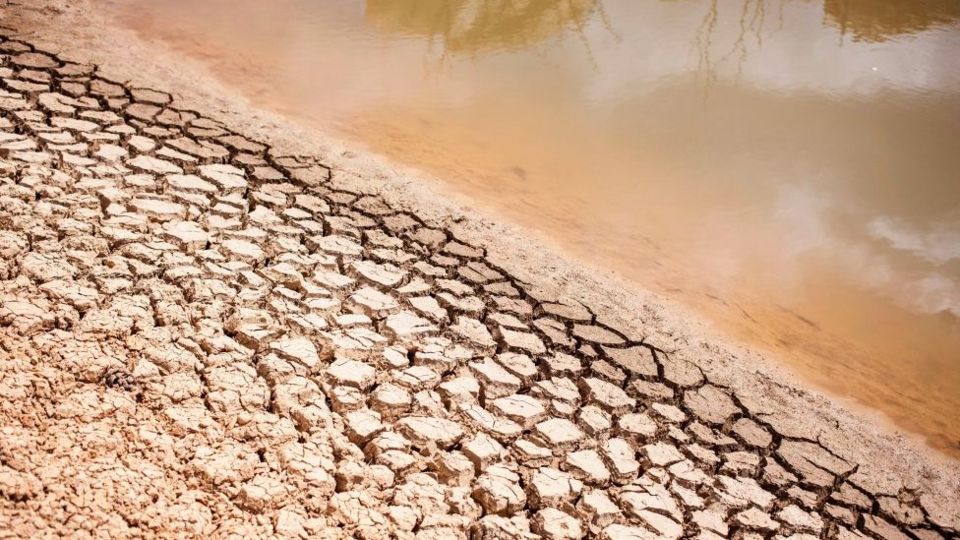
WIKUS DE WET
This picture shows scorched earth and low water levels in South Africa, as a result of draughts
Scientists studying the effects of climate change have warned that we need to make massive changes to the way that we live our lives in order to tackle the problem of global warming.
They've also said that we need to do more than we previously thought we did.
A target was in place for us to try to stop the world's temperature from rising by any more than 1.5°C. Not only are we not meeting that target, but the report suggests that the world is in fact heading for a 3°C increase in temperature.
This could have huge consequences for the planet and experts are calling on world leaders to tackle the problem urgently.
According to the report - which has taken scientists three years to put together - keeping the temperature rise to under 1.5°C will require "rapid, far-reaching and unprecedented changes in all aspects of society".
It explains that time is running out and it will be hugely expensive, but the opportunity to do something is still possible - if action is taken now.
What do they say we need to do?
In the report, scientists outline steps we can take to help the world's temperature to stay under the 1.5°C target.
These include:
- The amount of CO2 being emitted into the atmosphere around the world needs to go down by 45% from 2010 levels by 2030
- 85% of the world's electricity needs to be produced using renewable energy (e.g. wind farms)
- We need to stop burning coal as an energy source
To enjoy the CBBC Newsround website at its best you will need to have JavaScript turned on.
What happens if we don't take action?
Basically, they say it would be very bad news for the planet.
Coral reefs would be wiped out with a 2°C increase in temperature and global sea-levels will rise around 10cms, which would increase the risk of flooding for millions of people around the world.
The ability to grow certain crops like rice and wheat could also become more difficult.
The report says hard decisions can't be ignored anymore and governments need to take more action "immediately".
Is this a new issue?
The short answer is, not at all.
Back in 2015, leaders from 195 countries around the world got together to sign something called the Paris Agreement, which was a huge international deal making promises to do something about climate change.
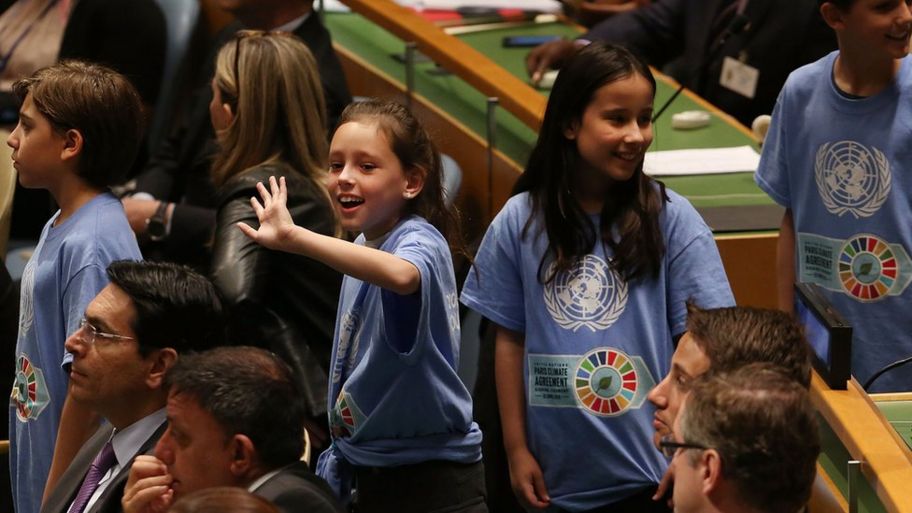
Getty Images
Children from around the world stood alongside world leaders and country delegates at a signing ceremony for the Paris Agreement
One of the big things that leaders agreed was to take steps to stop global temperature increasing by more than 2°C - and to try to limit it to 1.5°C.
But one of the heads of this new study Prof Jim Skea believes that we now need to go further than what was agreed in the Paris deal. "Just fulfilling the pledges made in the Paris agreement for 2030... is not good enough," he said.
Watch this video from 2015 which explained the issues around climate change ahead of the Paris agreement being signed.
To enjoy the CBBC Newsround website at its best you will need to have JavaScript turned on.
In August 2018, a big report was published about something called Hothouse Earth conditions.
The international team of climate researchers behind the report explained how they believed the world is at risk of tipping into extremely dangerous levels of climate change - 'Hothouse Earth conditions' - when some parts of the Earth could actually become unsuitable for people to live in anymore.
They said current global warming could lead to sea levels being between 10-60m higher than they are today, flooding large areas of land.
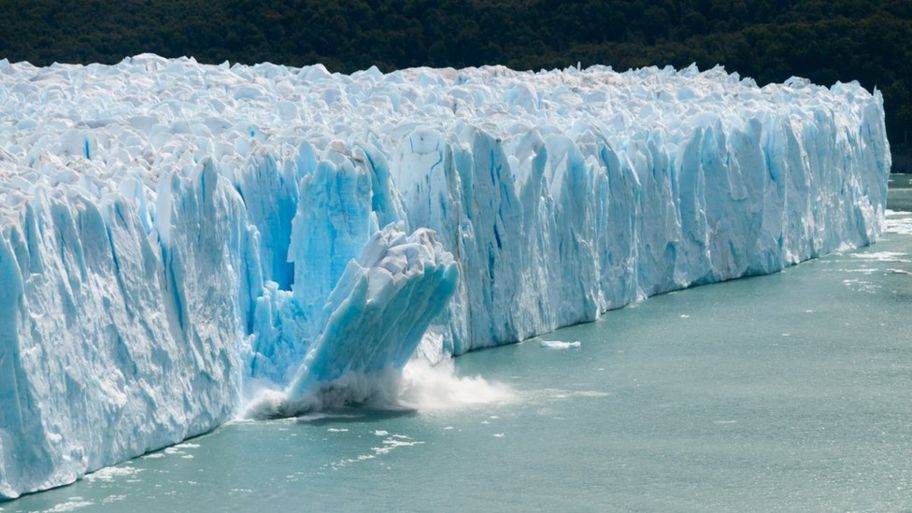
Getty Images
The Hothouse Earth report talked about how melting ice sheets would cause sea levels to rise significantly.
They also explained how forest, oceans and land which currently work to soak up about 4.5 billion tonnes of carbon (they get called 'carbon sinks' because of this) could actually start to emit carbon themselves, increasing the world's temperature even more.
Overall, the report - published in the Proceedings of the National Academy of Sciences - said warming could lead to a higher global temperature than at any time in the past 1.2 million years.
It also suggested that humans had possibly underestimated how sensitive the Earth is to warming.
One of the scientists involved in the report - Prof Rockstrom from Stockholm Resilience Centre - explained how the recent heatwaves and extreme conditions around the world may be helping to show how quickly and dramatically things can change.
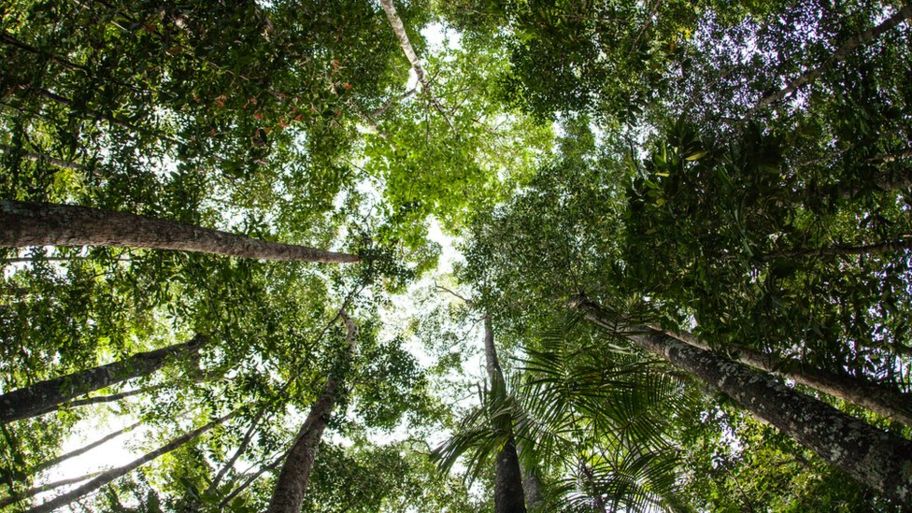
EPA
Experts have said that there are many steps humans can take to help to reverse the effects of global warming, such as planting more trees
The issue is that, while the biggest impacts of all this may not be felt for hundreds of years, once it starts, we won't really be able to do anything about it - so experts say it's important we take steps now to stop the 'Hothouse Earth' situation from happening.
The report included some pointers about how countries might do this, including:
- Stop burning fossil fuels by the middle of this century
- Planting more trees
- Protect forests
- Work out how to block the Sun's rays
- Develop machines to suck carbon out of the air
While many scientists say their conclusions are sound, not everyone agrees with what they have written. Some experts say that the picture painted by the Hothouse Earth report is too extreme.
But one thing that everyone seems to agree on at the moment is that humans need to make some big changes in order to protect our planet.
What can YOU do to help?
There are several things that you can do at home to do your bit to protect the planet.
Here are five things to get you started!
- Plant trees - Whether it's in your garden or getting involved in planting trees around your local area, the more trees, the better!
- Shop responsibly - Buy less meat, milk, cheese and butter and more locally sourced seasonal food. Unnecessarily flying food products around the world is a source of CO2 emissions.
- Don't be wasteful - A huge amount of food is chucked away every single day. Be more savvy with your food waste - could you make it into something else?
- Travel smart - Transport is a huge factor in carbon emissions, so think about more green ways to travel. If it's a short distance, could you walk or cycle? If it's slightly further, could you take a train or a bus, instead of driving? Do you know any adults who drive petrol or diesel cars - could you tell them about electric ones?
- Save energy - We could all probably use less electricity around the house. Is it nice weather outside? Could you hang the washing out to dry rather than use a tumble dryer? Do you really need to leave all of those lights switched on? Do you really need to have the heating on or could you put on another jumper? Has your house got good insulation? All of these considerations help to save electricity and - therefore - the planet.
https://www.bbc.co.uk/newsround/45094689
相當長時間以來,科學家們一再拉警報,氣候變化導致地球升溫,再不採取行動,地球和人類以及其它地球生命都將毀滅,而拯救地球所剩時間屈指可數。國際社會和許多國家政府都承諾要採取行動保護地球,減緩氣候變暖速度。
聯合國政府間氣候變化專門委員會(IPCC)仁川會議發出警報,「最後的警報」,宣告全球變暖將引爆氣候和生態環境災難,留給人類化解這個危機的時間不多了。
氣候議題之緊迫和重大,甚至驚動了諾貝爾獎。2018年諾貝爾經濟學獎10月8日頒給了兩位在解決氣候變化難題方面做出獨到貢獻的美國經濟學家,一位研究氣候經濟學,另一位研究健康的、可持續的經濟增長率。
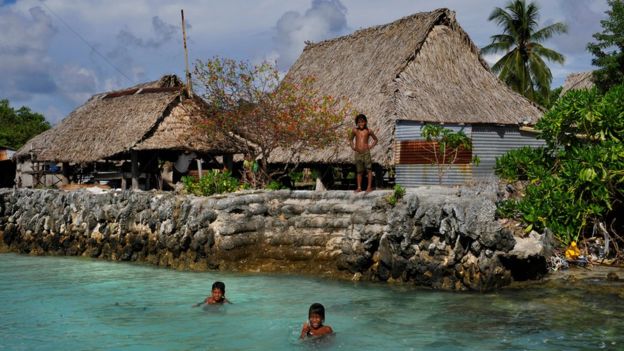
圖片版權 Getty Images
「熱室地球」什麼概念?
熱室條件下巧克力將稀缺甚至絶跡,北極冰川融化,海平面上升迫使島國搬家,以及旱澇的極度異常等。
這些只是瑞典斯德哥爾摩社會生態系統應變及發展研究中心(Stockholm Resilience Centre)科學家描繪的部分災難性場景。
- 巧克力缺貨
- 北冰洋冰蓋融化
- 島國沉沒
- 旱澇更難預測
- 珊瑚絶跡
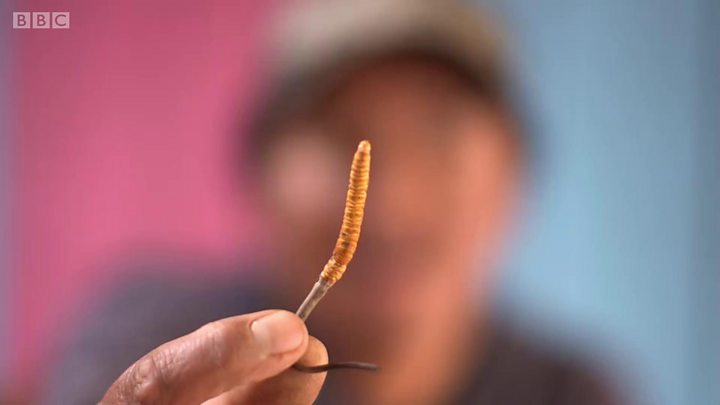
蟲草
諾貝爾經濟學獎的信息
耶魯大學氣候經濟學教授威廉·諾德豪斯(William Nordhaus)1994年提出一個氣候經濟學模型,DICE(Dynamic Integrated Climate- Economy),將經濟學、碳循環、氣候科學等一系列研究對接,使得溫室效應和氣候變暖的成本和收益可以量化衡量,為制定行動計劃提供依據。
他認為解決溫室效應的最有效方式是全球範圍徵收碳稅。
另一名獲獎經濟學家保羅·羅默(Paul Romer)是斯坦福大學教授,經濟增長理論專家。他的獲獎成就涉及健康的、可持續的經濟增長。
諾貝爾獎委員會表示,正值諾貝爾經濟學獎設立50週年,兩位關注氣候、環境和增長的經濟學家得獎,就是希望傳達一個信息:氣候變化問題是全球問題,需要全球性的解決方案。
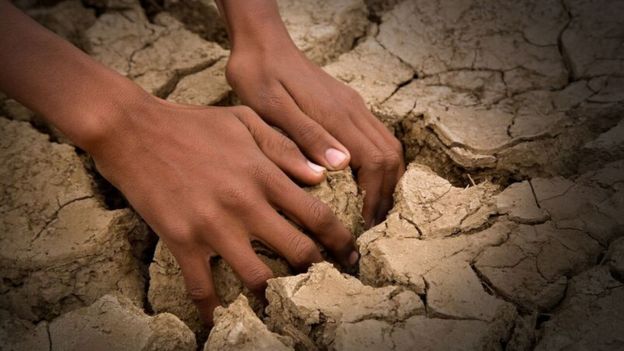 圖片版權 Getty Images
圖片版權 Getty Images
個人可以做什麼
既然行動刻不容緩,那麼從哪裏著手?全球四大領域需要迅速、深遠的變革:能源、土地利用、城市、產業。
個人可以從衣食住行開始。
具體而言,IPCC聯合主席黛博拉·羅伯茨博士說,個人也許無法決定土地怎麼用,種什麼,卻完全可以決定自己餐桌上要什麼不要什麼。
個人可以決定步行、騎自行車還是開車,如果開車也可以選擇電動車、混合動力車、汽油還是柴油車,或者搭乘公交車。
節約用電、用煤氣也是個人力所能及的:可以用晾衣繩,不用烘幹機、空調溫度設高一點,暖氣溫度降低一點、有可能的話選擇太陽能熱水器,等等。
餐桌上可以少一點肉類和乳製品,多一點蔬菜水果;盡量買本地的農產品和應季果蔬。
循環利用,節約用水,分享和相互提醒,這些也都是個人可以做到的。
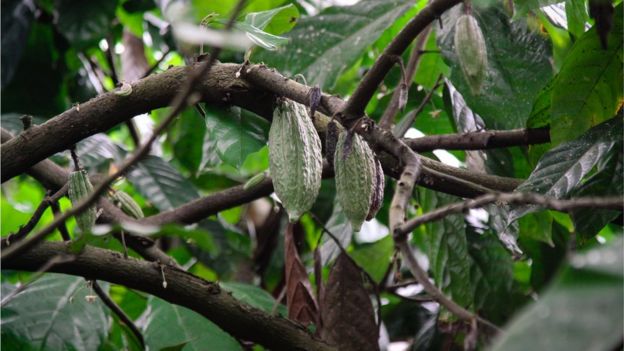
圖片版權 Getty Images
政府可以做什麼
聯合國說,遏制氣候變化,1.5攝氏度是個標桿,這個刻度只需要12年就會被超越,也就是2030年。IPCC公布了一份「0.5攝氏度」特別報告,強調把氣溫控制在工業革命前水平的1.5攝氏度以上,而不是2攝氏度,對拯救地球至關重要。
這是3年的研究,加上科學家和政府官員在韓國仁川一周的辯論的結果。
紙上數字減了0.5,到現實中則意味著人類社會發生全方位各層面的迅疾而深遠的變化。
0.5的差別凸現了科學家的堅持和政府官員的經濟和民生利弊考慮。
科學家認為形勢刻不容緩,再等就太晚了,也許特別想大喊一聲:"快行動!傻瓜!"
仁川會議的特別報告為這聲吶喊提供了數字和事實依據。
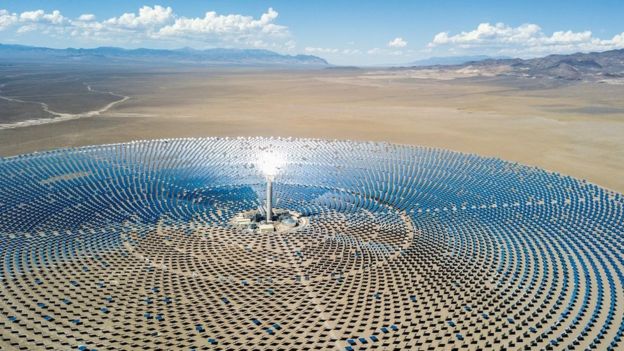
圖片版權 Getty Images
1.5攝氏度這個目標是可以達到的,但需要大家真的立刻行動起來,從政府到個人,還需要連續20年每年為此投入相當於全球經濟產值2.5%的錢。
而且,還需要依靠樹木植被和機器捕撈空氣中的碳,然後深深地、永久性地埋到地底下。
這項巨大的人類工程估計耗資巨大。
報告為各國決策者列出了5個步驟:
- 到2030年,全球碳排放在2010年基礎上減少45%;
- 到2050年,可再生能源發電佔全球發電量85%;
- 煤炭使用減少到接近零
- 能源作物種植面積達到700萬平方公里(比澳大利亞面積略小)
- 到2050年全球實現碳淨排放為零
BBC科技事務編輯戴維·舒克曼(David Shukman)認為, 歸根結底,決策者有兩個選擇:讓民眾相信那些激烈的變革是必需的,而且刻不容緩,或者無視報告提出的警告和行動建議,對民眾說科學家們搞錯了。
https://www.bbc.com/zhongwen/trad/science-45785372
沒有留言:
張貼留言